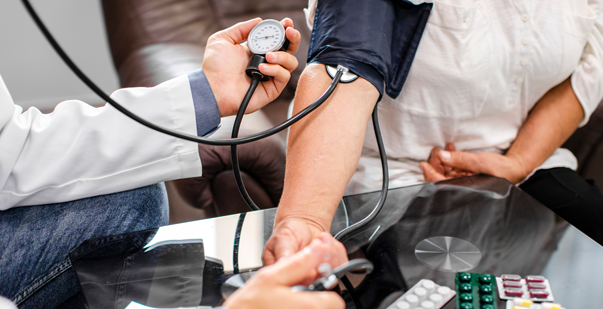Blood pressure and heart rate are two major indicators of our cardiovascular health. While they both give information about how well our heart and circulatory system are functioning, they measure different aspects. On one hand, blood pressure is the force of blood pushing against the walls of the arteries, consisting of systolic and diastolic pressures. On the other hand, our heart rate is measured in beats per minute (bpm). It indicates how many times the heart beats per minute.
So, understanding the relationship and differences between these two metrics is crucial for preventing cardiovascular diseases and maintaining good health. Let’s explore the concept of heart rate vs blood pressure further and learn about their significance and implications .
Master ACLS Now
Get ACLS certified with confidence
How are Heart Rate and Blood Pressure Related?
Understanding the relationship between heart rate and blood pressure is essential to know about our cardiovascular health. Let’s see how these are related :
Heart Rate and Cardiac Output:
The heart rate impacts our cardiac output directly. This is the volume of blood pumped by the heart per minute. As the heart rate increases the cardiac output also increases, and this leads to higher blood pressure.
Autonomic Nervous System Control:
The autonomic nervous system regulates heart rate and blood pressure. Changes in one can trigger adjustments in the other. This happens through the sympathetic and parasympathetic pathways.
Exercise and Stress Response:
During physical activity or stress, heart rate and blood pressure rise to meet the increased demand for oxygen. So, this response ensures adequate blood flow to tissues and organs.
Medications and Health Conditions:
Some medications and health conditions can affect both heart rate and blood pressure. For example, beta-blockers can lower the heart rate and blood pressure, while stimulants may increase both of these.
Read more: What is the difference between cardiac arrest and a heart attack?
What Does BPM Mean and How Does it Relate to Blood Pressure?
Let’s explore how BPM relates to blood pressure along with it’s meaning.
Definition of BPM:
BPM stands for beats per minute which shows the frequency of heart contractions. It is commonly used to measure heart rate and assess cardiac function.
Relationship Between BPM and Blood Pressure:
While BPM measures the rate of heart contractions, blood pressure indicates the force exerted by circulating blood on the walls of blood vessels. So, an increase in BPM can lead to higher blood pressure because the heart pumps more frequently.
What is the Difference Between Heart Rate and Blood Pressure?
Heart rate and blood pressure are two distinct measurements that provide valuable insights into cardiovascular health. Let’s understand what makes them different:
| Aspect | Heart Rate | Blood Pressure |
| Definition | Number of heartbeats per minute (BPM) | Force exerted by blood on artery walls |
| Measurement | Typically measured using a pulse oximeter or ECG | Measured using a sphygmomanometer as systolic/diastolic pressure |
| Unit | Beats per minute (BPM) | Millimeters of mercury (mmHg) |
| Variability | Can vary depending on physical activity, stress, and overall health | Can fluctuate based on factors such as stress, hydration, and medication |
| Clinical Significance | Reflects cardiac function and overall fitness | Indicates the health of the cardiovascular system and risk of heart disease |
| Example | Resting heart rate of 70 BPM | Blood pressure reading of 120/80 mmHg |
Can You Have Normal Blood Pressure but High Heart Rate?
Yes, you can have normal blood pressure but a high heart rate in specific situations. Let’s explore when this occurs.
Physical Activity:
Exercise increases heart rate to meet oxygen demands, while blood pressure often remains normal as arteries dilate.
Stress:
Stress triggers adrenaline release, elevating heart rate without affecting blood pressure.
Fever or Illness:
Infection or illness can raise heart rate due to the body’s response, while blood pressure stays stable.
Medications:
Certain drugs or stimulants can independently increase heart rate while keeping blood pressure normal.
Hyperthyroidism:
An overactive thyroid gland leads to a heightened heart rate, but blood pressure usually remains within the normal range.
Pulse vs. Blood Pressure – What’s the Connection?
Let’s explore how our pulse and blood pressure are connected:
- Pulse reflects heart rate and rhythm, while blood pressure indicates vascular force.
- Both these metrics are important to diagnose and manage any heart condition.
- Monitoring pulse and blood pressure together gives us an in-depth view of heart health.
- Abnormalities in either can point towards an underlying cardiovascular issue.
- Understanding this connection helps in preventing and treating heart-related problems.
Read more: Upskill and grow your career with an Advanced Cardiovascular life support certification
Conclusion
Thus, understanding heart rate vs blood pressure and knowing the differences is crucial so that we can keep our hearts healthy. By understanding how they work together, we can take care of our cardiovascular system in the best possible way. So, it is important to have regular check-ups, follow healthy habits, and be informed about our health. This way we can stay on top of our heart health and prevent any cardiac complications.







